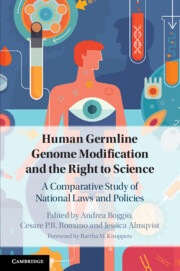 Human Germline Genome Modification and the Right to Science
Human Germline Genome Modification and the Right to Science from Part II - Europe
Published online by Cambridge University Press: 15 November 2019
The use of genetic technologies for reproductive, farming, agricultural and scientific purposes has long been a matter of public concern in Switzerland. As a result of a series of legislative initiatives at the federal level, as well as of popular referenda, the country developed one of the most restrictive regulatory environments in Europe for research, potentially leading to human germline genome modification. In particular, any genetic manipulation of reproductive cells or embryos is strictly forbidden, regardless its intended purpose. This chapter will illustrate the way constitutional- and federal-level legislation, as well as international law and regulatory provisions rigidly constrain research activities that could potentially lead to genetic alterations in humans and their progeny. In such a restrictive context, it is highly unlikely that recent technical advances in genetic engineering and genome editing will be employed to produce germline genome modifications for either medical or purely scientific purposes. Furthermore, while the Swiss National Advisory Commission for Biomedical Ethics has recently expressed partial support for basic research possibly involving the genetic modification of human embryos, there are currently no indications that legislative initiatives will be undertaken to ease current regulations on such controversial matters.
To save this book to your Kindle, first ensure no-reply@cambridge.org is added to your Approved Personal Document E-mail List under your Personal Document Settings on the Manage Your Content and Devices page of your Amazon account. Then enter the ‘name’ part of your Kindle email address below. Find out more about saving to your Kindle.
Note you can select to save to either the @free.kindle.com or @kindle.com variations. ‘@free.kindle.com’ emails are free but can only be saved to your device when it is connected to wi-fi. ‘@kindle.com’ emails can be delivered even when you are not connected to wi-fi, but note that service fees apply.
Find out more about the Kindle Personal Document Service.
To save content items to your account, please confirm that you agree to abide by our usage policies. If this is the first time you use this feature, you will be asked to authorise Cambridge Core to connect with your account. Find out more about saving content to Dropbox.
To save content items to your account, please confirm that you agree to abide by our usage policies. If this is the first time you use this feature, you will be asked to authorise Cambridge Core to connect with your account. Find out more about saving content to Google Drive.